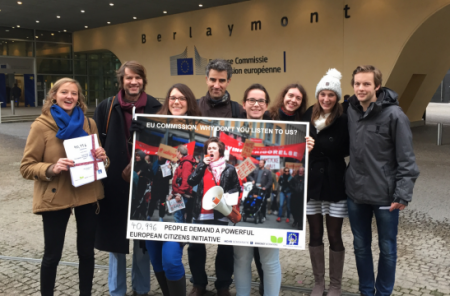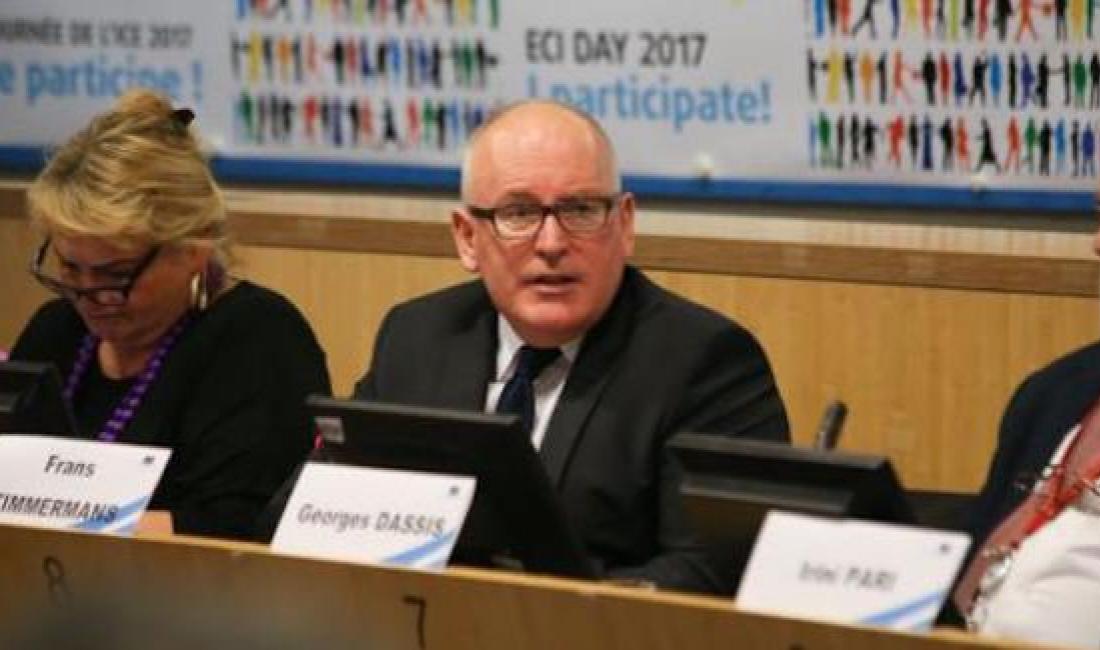On 11 April 2017, in a rare moment of positive international news for more democracy, the European Commission declared to revise the EU legislation concerning the European Citizens’ Initiative (ECI). The announcement came after arduous campaigns by Democracy International and other civil society groups to improve the ECI. It is a window of opportunity to introduce real direct democracy at EU level.
First Vice-President Frans Timmermans made the unexpected announcement on 11 April 2017 at the annual European Citizens’ Initiative Day held by the European Economic and Social Committee, co-hosted by Democracy International together with other partners. The ECI is an instrument of participatory democracy that allows citizens to bring forward their legislative proposals to the Commission. These proposals must be backed by the signatures of at least one million EU citizens from at least seven member states.
Mr Timmermans, who was absent at last year’s ECI Day, used his time during the opening panel on the enthusiastic pleas for the often criticized Union: “We are a force for liberty, openness and cooperation”. But then the former Dutch Foreign Minister continued with rather critical analysis on the state of democracy: “We are living in a post-paternalistic era stuck with a paternalistic system of government”.
This in turn led the 56-year-old Timmermans to address the need of greater citizens participation in modern politics: “citizens need to get a chance to engage more directly”. And then Timmermanns made an announcement that took most ECI day participants – a crowd of about 200 experts and supporters of the tool – by obvious surprise: “We will next week publish a roadmap for the revision of the ECI regulation.”
More participatory ground
Timmermans’ tone was cautious, but he made clear that he envisaged to have the revised law adopted by the time when the next European Parliament is to be elected in spring 2019 (and a new Commission will be elected). In and of itself, the statement broke more participatory ground that any comment from a leading EU commissioner since the former Vice-President Margot Wallströms strong promotion of participatory democracy a decade ago.

The statement also felt like a reversal by the Dutch Social Democrat, as he and the Commission, led by Jean-Claude Juncker, have been criticized harshly in recent years for not sufficiently addressing the democratic opportunities offered by the ECI. For example, when Democracy International handed over to the EU Commission a petition demanding improvement of the ECI in October 2016, the European Commission still declared not to revise the EU regulation. But now this has changed.
Big and small fixes
According to the ECI law , a review of the tool was supposed to be conducted three years after it took force. Since the ECI was opened for use in April 2012, that review should have happened in 2015, but the commission refused to consider a review, or anything revision. Instead the responsible Commissioner, Mr. Timmermans, produced first a report explaining that a revision was not on the table for the time being. He also started to address technical and practical issues, which did not require a law revision at all. Such issues and improvements included the Commission’s own management of the ECI and greater flexibility for legal registration of a proposed initiative.
This flexibility has had an impact already: the Commission, after having refused almost every third initiative for the first three years, has struck down only one such initiative during the last two years (it deal with the trade agreement known as TTIP).
In the meantime, many other fixes, some big and some small, were introduced. They included more and better official assistance to the organisers and stronger communicadtion with interested parties during the ECI process. The ECI, the world’s first transnational tool of direct and digital democracy, was introduced as part of the latest Treaty Reform (Lisbon Treaty Art. 11.4). it has introduced an inspiring direct democratic umbrella for the 500-million-inhabitants of the Union. However, many cumbersome hurdles built into the current law have effectively prevented the ECI from reaching its full potential as a democratic tool at the European level.
Towards a new supportive platform
For example, there are many varied requirements for statements of support to be validated in the 28 EU member states, which means that certain EU citizens have many more problems expressing their preferences than others do. Also, legal liability laws that protect personal information prevent many EU citizens from taking on an ECI. The risk is that they can be held liable if the personal information of signatures, collected on ECI statements of support, are incorrectly used.
It had been unclear whether such issues would be addressed – at least before the ECI Day 2017 on April 17. But Timmermans and the EU indicated a change of direction , and admitted the need of a much more supportive infrastructure for EU citizens seeking to use the ECI or participate in other ways. One sign of a more open approach was the launch of the first electronic version of the “European Passport to Active Citizenship”. Another was the call for a consultation on a new supportive platform for ECIs, that would be managed by the EU Commission in collaboration with the EU Parliament.
This text is a slightly adapted version of the article published first by Bruno Kaufmann at the online portal people2power that you can read here.




